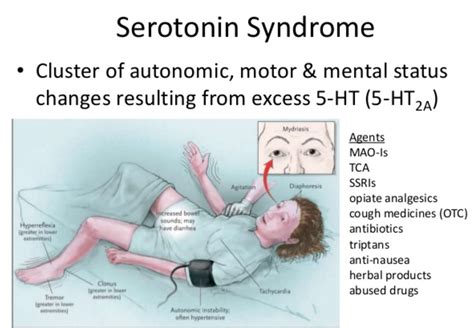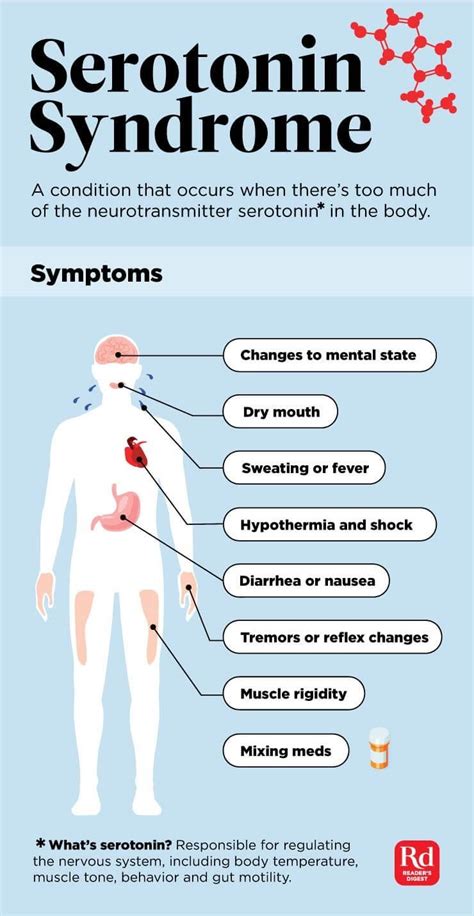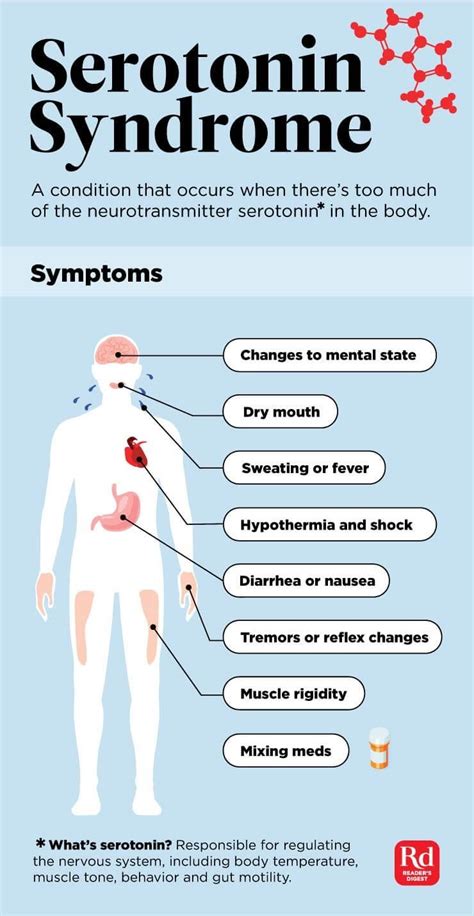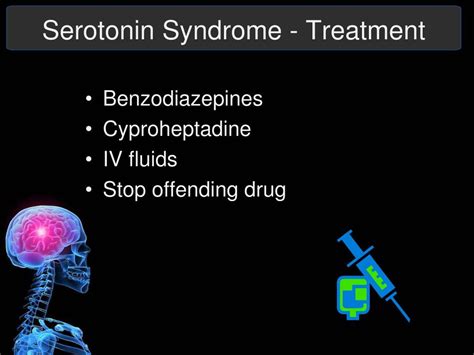Intro
Identify Serotonin Syndrome signs, symptoms, and treatment. Learn about this life-threatening condition, its causes, and risk factors, including medication interactions and overdose, to recognize the warning signs of serotonin toxicity and seek medical help promptly.
Serotonin is a vital neurotransmitter in the human body, responsible for regulating various physiological and psychological processes, including mood, appetite, sleep, and memory. However, when serotonin levels become too high, it can lead to a potentially life-threatening condition known as serotonin syndrome. This condition occurs when the body has an excessive amount of serotonin, which can be caused by certain medications, supplements, or a combination of substances. Recognizing the signs of serotonin syndrome is crucial for prompt medical attention and treatment.
The importance of understanding serotonin syndrome cannot be overstated, as it can affect anyone who takes certain medications or supplements. With the increasing use of antidepressants, anti-anxiety medications, and other substances that affect serotonin levels, the risk of developing serotonin syndrome has become more significant. Moreover, the condition can be misdiagnosed or overlooked, leading to severe consequences. Therefore, it is essential to educate oneself about the signs, symptoms, and treatment options for serotonin syndrome.
Serotonin syndrome can be mild, moderate, or severe, and its signs can vary depending on the individual and the underlying cause. In mild cases, the symptoms may be similar to those of other conditions, making it challenging to diagnose. However, as the condition progresses, the symptoms can become more pronounced and severe. It is crucial to seek medical attention immediately if you or someone you know is experiencing any of the signs of serotonin syndrome.
Serotonin Syndrome Causes

Medications That Can Cause Serotonin Syndrome
Some medications that can cause serotonin syndrome include: * SSRIs, such as fluoxetine (Prozac), sertraline (Zoloft), and paroxetine (Paxil) * MAOIs, such as phenelzine (Nardil) and tranylcypromine (Parnate) * Triptans, such as sumatriptan (Imitrex) and rizatriptan (Maxalt) * Anti-anxiety medications, such as buspirone (Buspar) * Antidepressants, such as trazodone (Oleptro) and nefazodone (Serzone)Serotonin Syndrome Symptoms

Mild, Moderate, and Severe Serotonin Syndrome
Serotonin syndrome can be categorized into three levels of severity: * Mild: Symptoms are minimal and may include mild agitation, confusion, or restlessness. * Moderate: Symptoms are more pronounced and may include rapid heart rate, changes in blood pressure, or increased body temperature. * Severe: Symptoms are life-threatening and may include muscle rigidity, seizures, or respiratory failure.Serotonin Syndrome Diagnosis

Diagnostic Criteria
The diagnostic criteria for serotonin syndrome include: * The presence of at least three of the following symptoms: confusion, agitation, restlessness, rapid heart rate, changes in blood pressure, dilated pupils, increased body temperature, or muscle rigidity. * The symptoms must be severe enough to require medical attention. * The symptoms must not be better explained by another medical condition.Serotonin Syndrome Treatment

Supportive Care
Supportive care is essential for managing serotonin syndrome and may include: * Fluid replacement to prevent dehydration * Oxygen therapy to maintain adequate oxygenation * Cardiac monitoring to detect any changes in heart rate or rhythm * Temperature control to manage hyperthermiaWhat is serotonin syndrome?
+Serotonin syndrome is a potentially life-threatening condition caused by excessive levels of serotonin in the body.
What are the symptoms of serotonin syndrome?
+The symptoms of serotonin syndrome may include confusion, agitation, restlessness, rapid heart rate, changes in blood pressure, dilated pupils, increased body temperature, or muscle rigidity.
How is serotonin syndrome diagnosed?
+Serotonin syndrome is diagnosed based on the presence of symptoms, medical history, and laboratory results.
What is the treatment for serotonin syndrome?
+The treatment for serotonin syndrome depends on the severity of the condition and may include discontinuing the offending medication or supplement, administering medications to counteract the effects of serotonin, and providing supportive care.
Can serotonin syndrome be prevented?
+Serotonin syndrome can be prevented by being aware of the potential risks and interactions of medications and supplements, and by consulting with a healthcare professional before taking any new substances.
In conclusion, serotonin syndrome is a serious condition that requires prompt medical attention. By understanding the causes, symptoms, and treatment options for serotonin syndrome, individuals can take steps to prevent and manage the condition. If you or someone you know is experiencing any of the signs of serotonin syndrome, it is essential to seek medical attention immediately. Share this article with others to raise awareness about the importance of recognizing and treating serotonin syndrome. Comment below with any questions or concerns, and let's work together to promote education and awareness about this critical topic.
